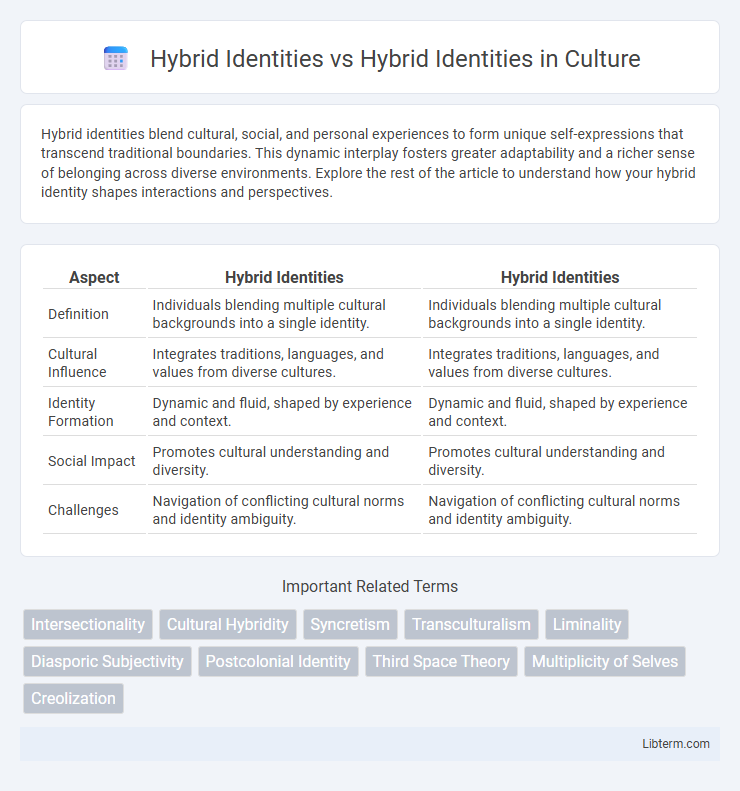Hybrid identities blend cultural, social, and personal experiences to form unique self-expressions that transcend traditional boundaries. This dynamic interplay fosters greater adaptability and a richer sense of belonging across diverse environments. Explore the rest of the article to understand how your hybrid identity shapes interactions and perspectives.
Table of Comparison
| Aspect | Hybrid Identities | Hybrid Identities |
|---|---|---|
| Definition | Individuals blending multiple cultural backgrounds into a single identity. | Individuals blending multiple cultural backgrounds into a single identity. |
| Cultural Influence | Integrates traditions, languages, and values from diverse cultures. | Integrates traditions, languages, and values from diverse cultures. |
| Identity Formation | Dynamic and fluid, shaped by experience and context. | Dynamic and fluid, shaped by experience and context. |
| Social Impact | Promotes cultural understanding and diversity. | Promotes cultural understanding and diversity. |
| Challenges | Navigation of conflicting cultural norms and identity ambiguity. | Navigation of conflicting cultural norms and identity ambiguity. |
Understanding Hybrid Identities: A Conceptual Overview
Hybrid identities represent the fusion of multiple cultural, social, or ethnic backgrounds that shape an individual's sense of self, emphasizing fluidity and adaptability in diverse contexts. This concept highlights the dynamic interplay between traditional heritage and contemporary influences, allowing individuals to navigate complex social landscapes with multifaceted identities. Understanding hybrid identities involves recognizing the ongoing process of identity negotiation and the impact of globalization, migration, and intercultural exchange on personal and collective identity formation.
The Evolution of Hybrid Identities in Modern Society
Hybrid identities have evolved as individuals increasingly blend cultural, ethnic, and social influences to forge unique self-representations in modern society. This evolution reflects globalization's impact, where cross-cultural interactions and digital connectivity intensify identity fluidity and multiplicity. The dynamic interplay between tradition and innovation shapes these hybrid identities, fostering inclusivity and challenging rigid categorizations.
Cultural Dimensions of Hybrid Identities
Hybrid identities encompass the merging of multiple cultural dimensions, blending distinct traditions, languages, and social norms into a cohesive self-concept. These identities reflect dynamic interactions between heritage and contemporary influences, often challenging rigid cultural boundaries and fostering cross-cultural adaptability. Understanding hybrid identities requires analyzing factors such as cultural hybridity, intersectionality, and transnationalism, which shape how individuals negotiate belonging and identity in multicultural contexts.
Psychological Impacts of Hybrid Identities
Hybrid identities often lead to psychological challenges such as identity confusion, cultural dissonance, and feelings of marginalization. Navigating multiple cultural frameworks can result in stress and anxiety but also foster resilience and adaptability. Research highlights that individuals with hybrid identities may experience both enhanced cognitive flexibility and a greater risk of identity-related conflict.
Hybrid Identities vs. Traditional Identity Paradigms
Hybrid identities combine attributes from multiple identity systems, offering enhanced flexibility and interoperability compared to traditional identity paradigms that rely on singular, centralized authentication methods. Unlike traditional identities, which often face limitations in scalability and cross-platform integration, hybrid identities enable seamless user experiences across diverse services by merging federated, decentralized, and biometric authentication factors. This approach not only strengthens security through multi-factor authentication but also supports dynamic user control and privacy, addressing modern digital identity challenges more effectively than conventional models.
Navigating Belonging and Alienation Within Hybrid Identities
Navigating belonging and alienation within hybrid identities involves embracing cultural fluidity while confronting social exclusion and identity fragmentation. Hybrid identities blend elements from multiple cultures, often resulting in a complex sense of self that defies singular categorization. This dynamic creates both opportunities for enriched cultural understanding and challenges in achieving acceptance within homogeneous social groups.
Hybrid Identities in a Globalized World
Hybrid identities in a globalized world emerge from the intersection of multiple cultures, languages, and social norms, creating dynamic and fluid self-conceptions that resist singular definitions. These identities enable individuals to navigate and integrate diverse cultural frameworks, fostering cross-cultural understanding and adaptability. The continuous exchange facilitated by globalization intensifies hybrid identity formation, challenging traditional boundaries of ethnicity, nationality, and cultural belonging.
Digital Spaces and the Formation of Hybrid Identities
Hybrid identities in digital spaces emerge from the complex interplay of online and offline self-representations, shaped by diverse cultural, social, and technological influences. Platforms like social media and virtual reality enable users to experiment with fluid personas, blending real-world experiences with digital expressions. This dynamic formation highlights the evolving nature of identity in contemporary digital environments, emphasizing hybridity as a key factor in personal and social identity construction.
Challenges and Opportunities of Living With Hybrid Identities
Living with hybrid identities involves navigating the complex interplay of multiple cultural, social, and personal influences that can lead to internal conflicts and identity confusion. Challenges include balancing contradictory expectations and facing social exclusion or stereotypes, while opportunities emerge through enhanced adaptability, cultural empathy, and enriched personal perspectives. Embracing hybrid identities fosters resilience and innovation, enabling individuals to bridge diverse communities and contribute meaningfully to multicultural societies.
The Future Trajectory of Hybrid Identities
The future trajectory of hybrid identities emphasizes the seamless blending of digital and physical personas, driven by advancements in augmented reality and biometric authentication. Emerging technologies enable users to navigate multiple platforms with unified identity management, enhancing security and personalization across virtual and real-world interactions. This evolution reflects a growing demand for flexible identity frameworks that support dynamic social and professional roles in increasingly interconnected ecosystems.
Hybrid Identities Infographic

 libterm.com
libterm.com